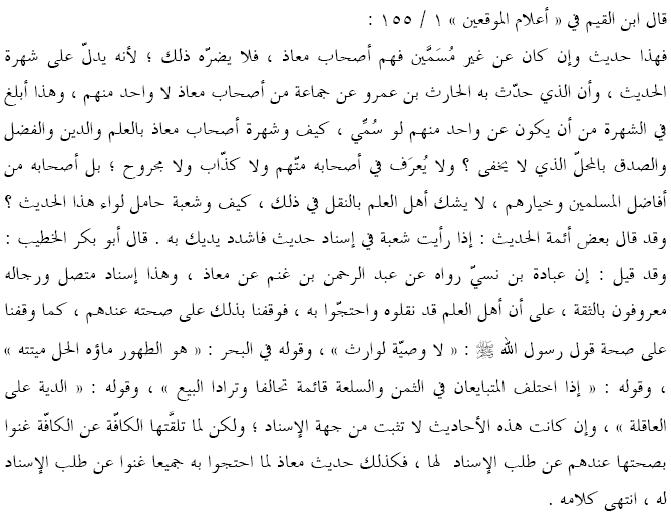- It is reported that when Rasulullah (Sallallahu Alayhi Wasallam) dispatched Hadhrat Mu’aaz (Radiyallahu Anhu) to Yemen, he asked him, “What procedure will you adopt when passing decisions in the affairs of the Muslims?” Mu’aaz (Radiyallahu Anhu) replied: “I will decide in accordance to the Qur’an.” Nabi (Sallallahu Alayhi Wasallam) then asked him: “If a law is not found in the Qur’an then what will you do?” He replied, “I will refer to the Ahaadith of Rasulullah (Sallallahu Alayhi Wasallam).” Nabi (Sallallahu Alayhi Wasallam) then questioned him: “If the ruling is not found in the Ahaadith, then what will you do?” He replied: “I will employ my ability of reasoning (ijtihaad) in reaching a conclusion.” Upon hearing this, Nabi (Sallallahu Alayhi Wasallam) said: “All praise be to Allah who inspired the messenger of Rasulullah (Sallallahu Alayhi Wasallam) Mu’aaz (Radiyallahu Anhu) with the correct guidance.” (Sunanut Tirmizi – Kitaabul Ahkaam – 1/247)[1]
Under the commentary of the above-mentioned Hadith, some scholars of Hadith explain [2]:
The purpose for Nabi (Sallallahu Alayhi Wasallam) questioning Hadhrat Mu’aaz (Radiyallahu Anhu) in the following manner was, so that the people realise his capability and have confidence in him. Rasulullah (Sallallahu Alayhi Wasallam) desired that the people of Yemen should refer their Deeni problems to Hadhrat Mu’aaz (Radiyallahu Anhu), and any decision passed by him should be readily accepted without any reservation. Otherwise it would seem quite strange of a leader to test the governor he already nominated at the time of bidding him farewell. For indeed Nabi (Sallallahu Alayhi Wasallam) was fully aware that Hadhrat Mu’aaz (Radiyallahu Anhu) possessed the full capability to manage the office of Qadha (passing judgments).
- Once Hadhrat Abu Musa (Radiyallahu Anhu) was questioned regarding the estate of a deceased who was survived by a daughter, paternal grandfather and sister. How should the estate be distributed? He replied saying: “Half the estate will be given to the daughter and the remainder half will be given to the sister. However, go to Ibn Mas’ood (Radiyallahu Anhu) for confirmation.” When Ibn Mas’ood (Radiyallahu Anhu) was informed of the verdict issued by Abu Moosa (Radiyallahu Anhu) he mentioned: “If this is the correct verdict, then certainly I am mislead from the path of those who are rightly guided. My verdict in this issue is in conformity with the verdict of Nabi (Sallallahu Alayhi Wasallam); half the estate will be given to the daughter, a sixth will be given to the paternal granddaughter in completion of two thirds of the estate and the remainder will go to the sister.” We then returned to Abu Musa (Radiyallah Anhu) and informed him of the verdict given by Ibn Mas’ood (Radiyallahu Anhu). Thereupon he said: “As long as this great Aalim is alive, I don’t see the need for you people to refer to me i.e. hold fast onto him and continue referring to him in all matters relating to Deen. (Bukhari Shareef – Kitaabul Faraaid – 2/997)
- Amr bin Maymoon reports that the messenger of Nabi (Sallallahu Alauhi Wasallam) Hadhrat Mu’aaz (Radiyallahu Anhu) came to Yemen; I loved him excessively so I remained with him until the end of his life. Thereafter I remained in search of the most knowledgeable person after him. Thereupon I met Abdullah bin Mas’ood (Radiyallahu Anhu). I also remained with him until the end of his life.
- Ikrimah (Rahmatullahi Alayh) reports that the people of Madina Munawwarah inquired from Ibn Abbaas (Radiyallahu Anhu) regarding the law of a woman who experienced haidh after her fardh tawaaf, should she wait until she becomes pure in order to perform the tawaaf-e-widaa or will it fall off? He replied that it will fall off and she may leave. Upon this the people of Madina said: “We will not practise on your opinion leaving out the view of Zaid bin Thaabit (Radiyallah Anhu).
In fathul Baari reporting from Thaqafi this statement of the inhabitants of Madina Munawwarah is reported in the following manner: “Wheather you express your view or not, we will hold onto the view of Zaid (Radiyallahu Anhu).
 Ihyaaud Deen An Effort to Revive Deen in Totality
Ihyaaud Deen An Effort to Revive Deen in Totality








